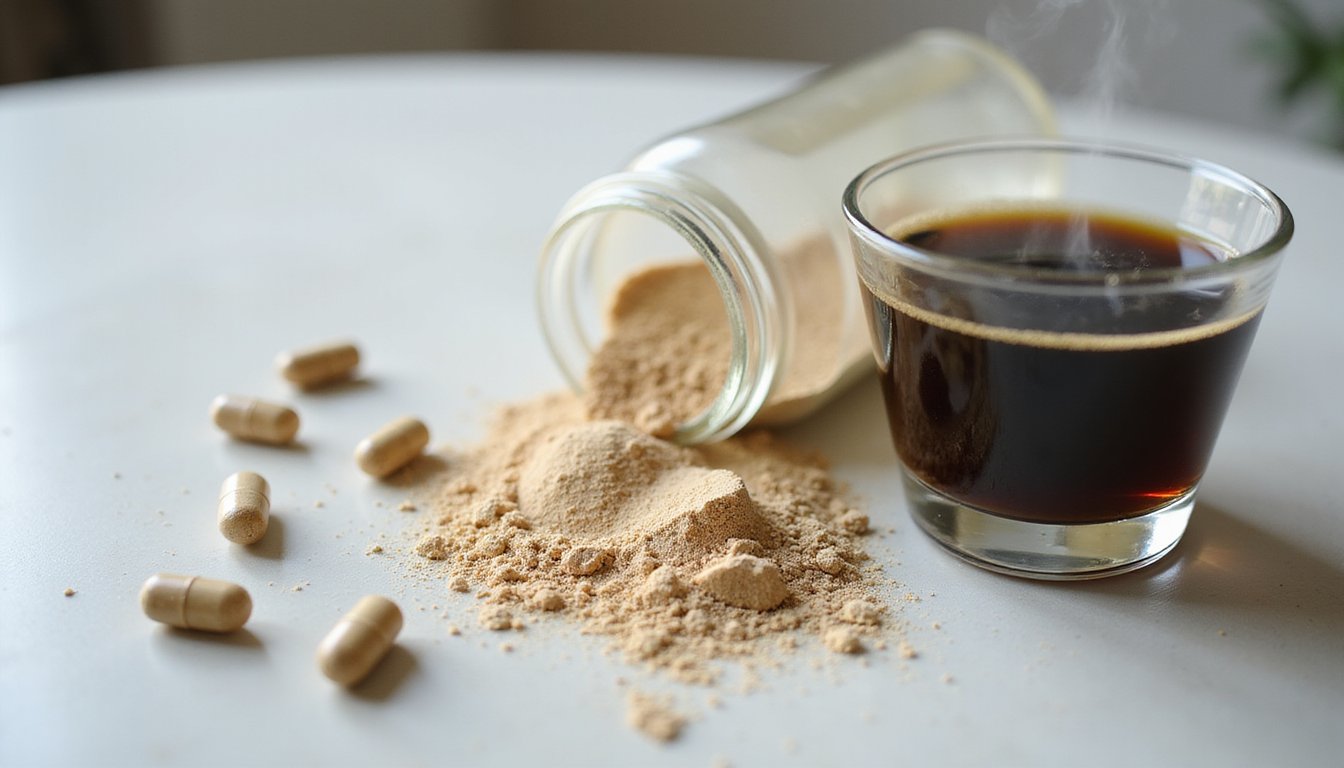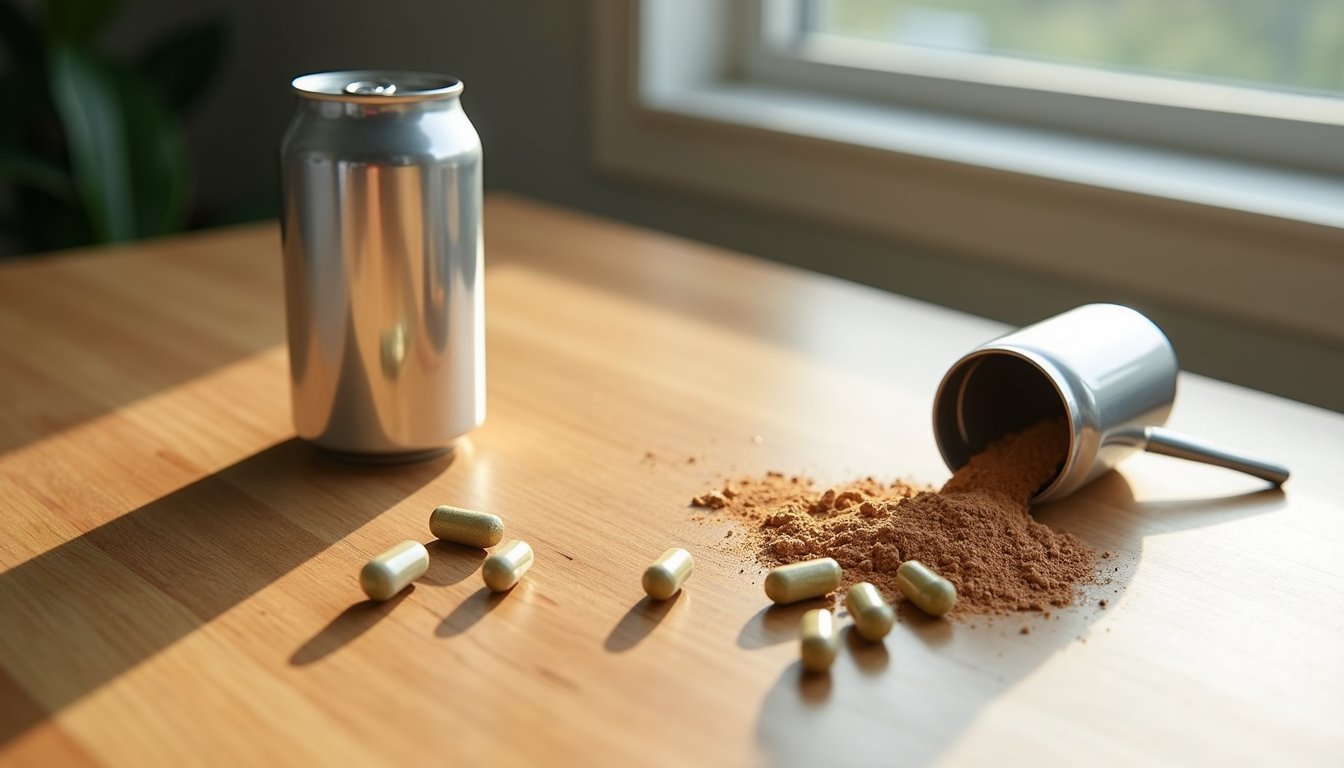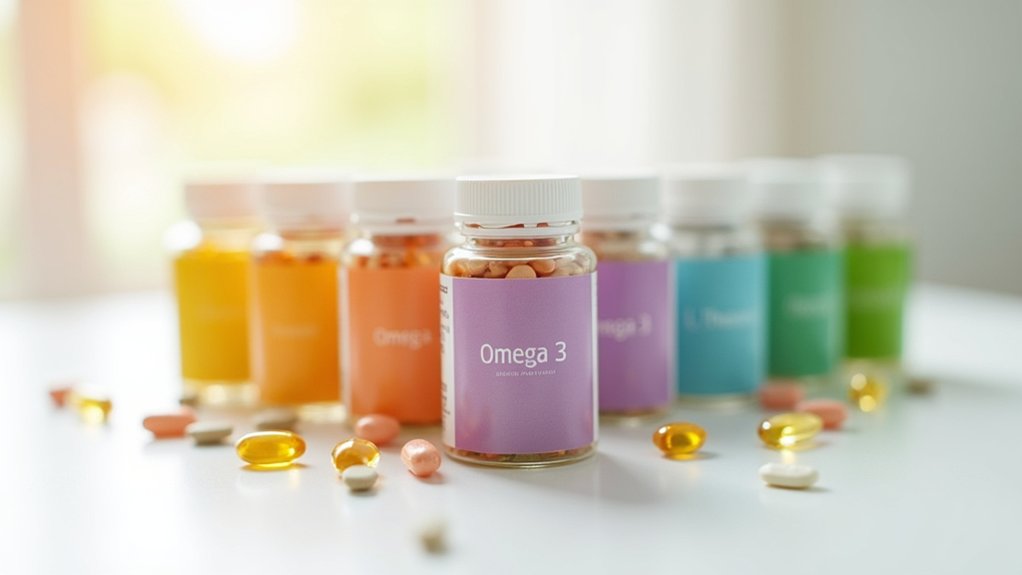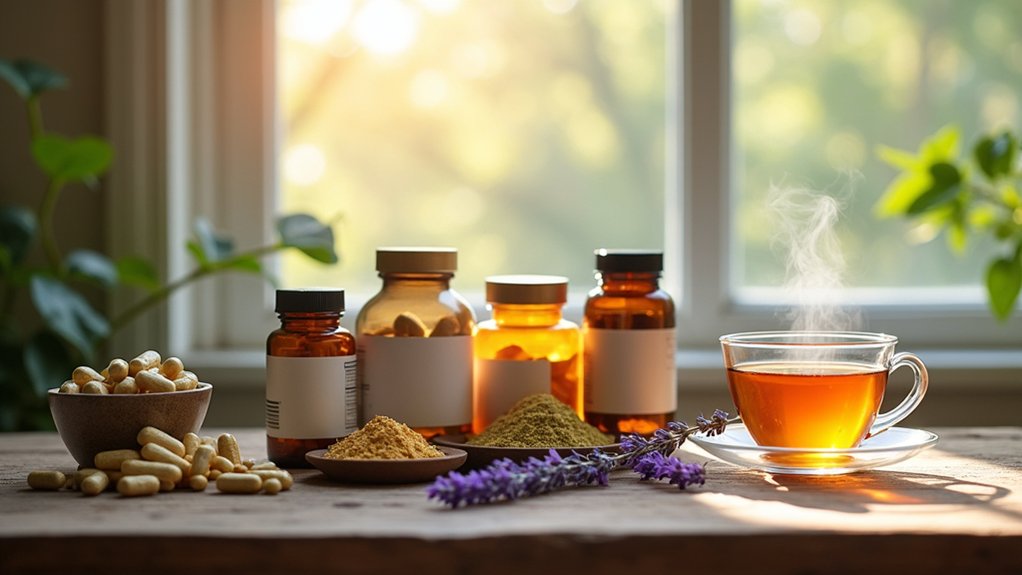Yes, certain supplements can trigger or worsen anxiety symptoms, particularly those containing central nervous system (CNS) stimulants like caffeine, guarana, or synephrine. Weight loss supplements often combine multiple stimulant ingredients that can amplify your body’s fight-or-flight response. Without proper FDA regulation, many products contain undisclosed or excessive amounts of these compounds. Understanding how different supplement ingredients affect your nervous system will help you make safer choices for your mental well-being.
Understanding CNS Stimulants in Common Supplements
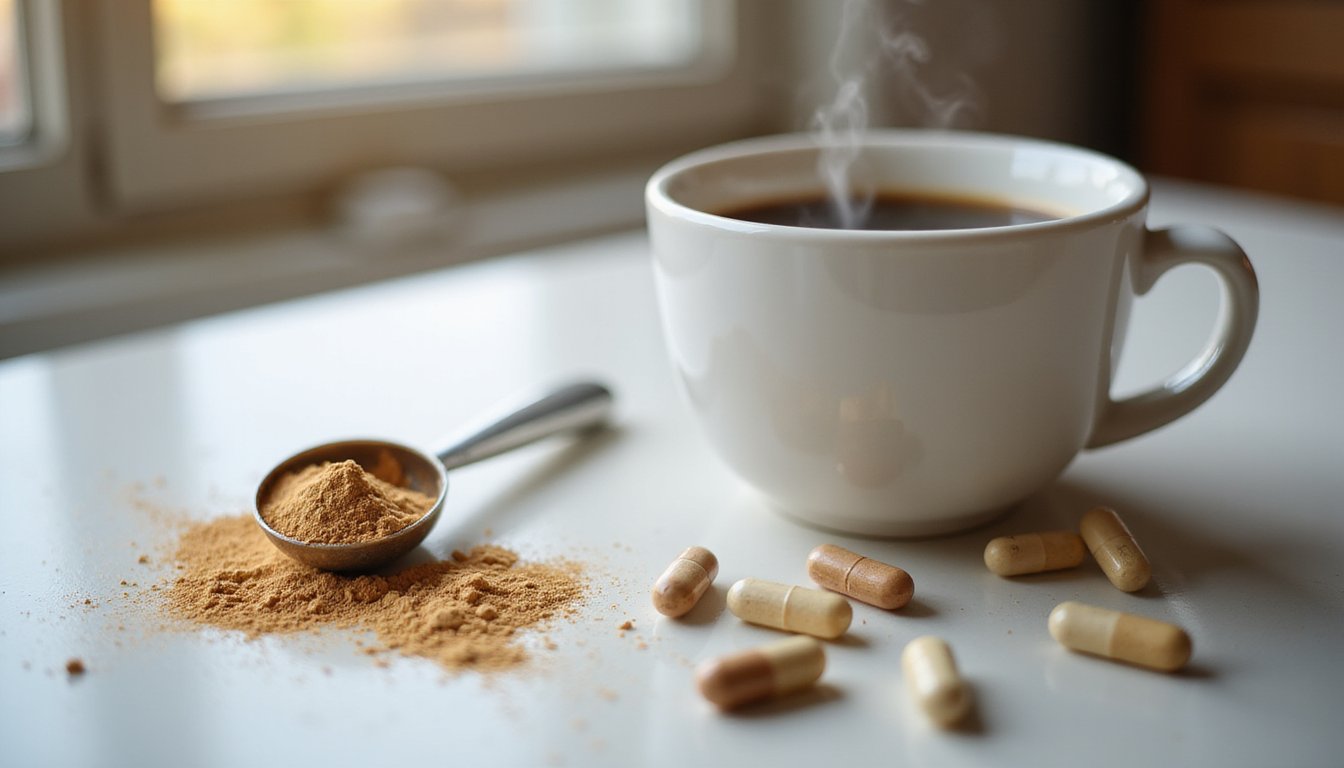
While many people take supplements to improve their health and performance, understanding central nervous system (CNS) stimulants in these products is essential for safety and efficacy. Evidence-based education reveals that these compounds work through various neurological pathways to boost alertness, mood, and energy. Common ingredients like B-complex vitamins are often included in excessive amounts without proven stimulant benefits.
You’ll commonly find natural stimulants like caffeine from coffee, tea, and guarana in supplements, alongside synthetic ingredients such as synephrine and DMAA. These substances typically affect your brain’s neurotransmitters, particularly dopamine and norepinephrine. Many supplements combine multiple stimulants for enhanced effects, but this practice can increase your risk of adverse reactions. Certain medical conditions like advanced arteriosclerosis may make stimulant use dangerous. Regular use of stimulant-containing supplements can lead to rapid tolerance development and dependency. Whether you’re using pre-workout powders, energy drinks, or diet pills, it’s imperative to recognize that these products often contain various stimulants that can greatly impact your nervous system.
The Hidden Dangers of Weight Loss Supplements
Weight loss supplements frequently contain stimulant ingredients that can drastically increase your risk of anxiety, with FDA reports showing concerning rates of psychiatric symptoms among users. You’ll find that many products contain hidden or unlabeled caffeine sources, which can compound stimulant effects and worsen anxiety symptoms, particularly when combined with other CNS stimulants. The lack of FDA regulation of over-the-counter supplements means many dangerous ingredients go unchecked. The research shows that ma-huang users face 2.2-3.6 times higher odds of developing psychiatric symptoms, including anxiety and neurotic behavior, highlighting the importance of scrutinizing supplement ingredients. Common ingredients like Panax ginseng have been linked to euphoria and nervousness, prompting additional concerns about these products’ effects on mental health.
Stimulant Ingredients Drive Anxiety
Many over-the-counter weight loss supplements contain central nervous system (CNS) stimulants that can markedly amplify anxiety symptoms through increased sympathetic nervous system activation. When you consume dietary stimulant combinations or engage in excessive supplementation, you’re exposing yourself to compounds like ephedra, synephrine, and hidden herbal stimulants that trigger fight-or-flight responses. While complementary and alternative medicines have shown promise in treating anxiety disorders, stimulant-based supplements often work against this goal. Natural supplements like L-theanine and ashwagandha offer safer alternatives for anxiety management.
Key anxiety-inducing mechanisms include:
- Sympathomimetic amines that replicate stress responses, causing palpitations and restlessness
- Unlisted stimulant alkaloids in “natural” herbal extracts that deliver potent pharmacological effects
- Additive effects when multiple supplements are combined with other stimulants
- Higher-than-recommended dosages that intensify CNS stimulation and anxiety risk
You’ll find these stimulants remain widely available despite FDA restrictions, particularly through online vendors with limited oversight. The scientific community continues to study these effects through open access publishing, allowing healthcare providers and consumers to stay informed about supplement risks.
Hidden Caffeine Sources Matter
Beyond the known stimulants in weight loss supplements lies an equally concerning issue: hidden caffeine sources that can compound anxiety symptoms. You’ll find significant transparency issues in many supplements, with studies revealing 210-310mg of caffeine per serving, far exceeding a cup of coffee’s 100mg. Some consumers unknowingly consume additional caffeine through decaffeinated coffee drinks, which can contain up to 14mg per serving. Excessive intake can lead to caffeine tolerance, making supplements less effective over time. The FDA only regulates supplement labeling minimally, requiring no specific caffeine content disclosure.
Common undisclosed ingredients like guarana, yerba mate, and green tea extract function as stealth caffeine sources, often marketed under “natural” or “herbal” claims. In a revealing study, 30% of analyzed supplements failed to list their caffeine content despite containing substantial amounts. The FDA’s minimal regulation of supplement labeling compounds this risk, particularly for anxiety-prone individuals. Multiple hidden sources in a single product can create unexpected stimulant effects, potentially triggering or worsening anxiety symptoms.
How Herbal Supplements Impact Anxiety Levels
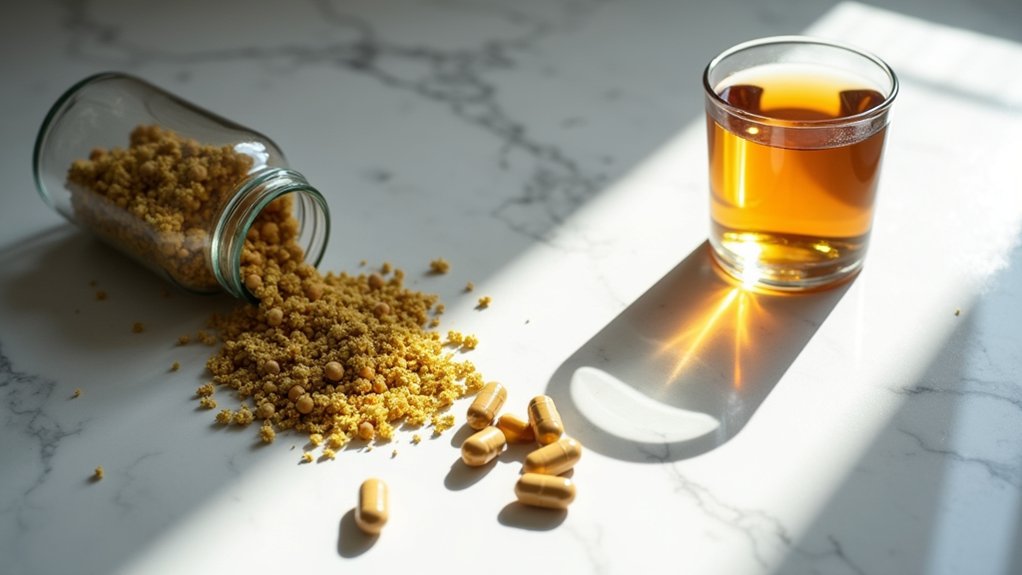
Research into herbal supplements reveals varying degrees of effectiveness in managing anxiety symptoms, with certain compounds demonstrating more robust clinical evidence than others. You’ll find significant variations in how these supplements affect anxiety levels, with both potential benefits and herbal risk factors to ponder. Inositol at 12 to 18 grams daily shows promising results for panic disorder treatment. Studies indicate that lavender aromatherapy can effectively reduce anxiety by lowering heart rate, blood pressure, and cortisol levels.
- Kava shows the strongest evidence for anxiety reduction, with 63% of clinical trials demonstrating positive results, though supplement dosage concerns remain important.
- Passionflower offers promising anxiolytic effects across different patient populations, particularly for perioperative anxiety and GAD.
- Valerian root works better in combinations than alone, primarily through GABA modulation.
- St. John’s Wort isn’t recommended as a primary anxiety treatment due to inconsistent results and potential drug interactions.
It’s vital to understand that some herbal supplements can actually trigger or worsen anxiety symptoms through CNS stimulation.
The Role of Micronutrient Balance in Anxiety
If you’re experiencing anxiety symptoms, magnesium deficiency may be a key underlying factor, as this essential mineral helps regulate nerve function and neurotransmitter balance. Your body’s zinc levels also play a pivotal role, with research showing direct correlations between zinc deficiency and increased anxiety states. Both minerals work synergistically in your nervous system, making it essential to maintain ideal levels through diet or supplementation under medical supervision. A deficiency in B complex vitamins can significantly impact your mood regulation and contribute to anxiety symptoms, as these nutrients are crucial for producing mood-stabilizing neurotransmitters like serotonin. Anxiety disorders affect 284 million people worldwide, making nutrient balance particularly important for managing this common condition.
Magnesium’s Impact On Nerves
Understanding magnesium’s impact on nerve function reveals its pivotal role in maintaining neural stability and reducing anxiety symptoms. This essential mineral regulates nerve transmission through magnesium calcium balance and supports nerve regeneration while inhibiting excessive neural excitation.
Key mechanisms through which magnesium influences nerve health:
- Acts as a calcium channel blocker, preventing nerve cell overexcitation
- Suppresses neuroinflammation by reducing inflammatory cytokines and substance P release
- Modulates NMDA receptor activity, instrumental for synaptic plasticity and neurotransmitter balance
- Supports myelin sheath maintenance for ideal nerve signal transmission
When you’re deficient in magnesium, you’ll experience increased neural excitability and inflammation, potentially worsening anxiety symptoms. Your body’s ability to maintain proper nerve function depends on adequate magnesium levels, making it paramount to maintain optimal intake through diet or supplementation.
Zinc Deficiency Anxiety Links
Clinical evidence demonstrates a compelling link between zinc deficiency and anxiety symptoms, with individuals experiencing anxiety showing markedly lower serum zinc levels compared to healthy controls. You’ll find that zinc copper imbalance plays an essential role, as anxious individuals exhibit considerably higher copper/zinc ratios that can disrupt neurological function and mood stability.
Through micronutrient screening, healthcare providers can identify these imbalances early. Research shows that correcting zinc deficiency through supplementation can reduce anxiety ratings by 31%, while normalizing serum zinc levels by 25%. This improvement stems from zinc’s indispensable role in neurotransmitter systems, particularly in GABAergic and serotonergic pathways. If you’re experiencing anxiety symptoms, especially alongside irritability or emotional instability, your healthcare provider may want to evaluate your zinc status.
Regulatory Gaps and Supplement Safety
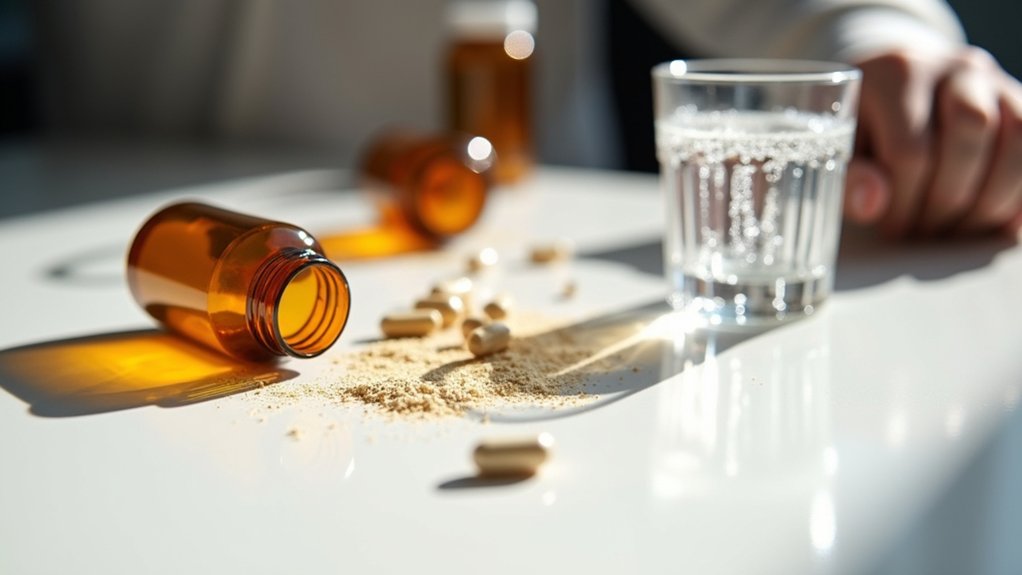
The regulatory landscape for dietary supplements in the United States reveals significant gaps in consumer protection and safety oversight. Despite regulatory burden reduction efforts, manufacturers aren’t required to prove safety or efficacy before marketing their products, creating potential risks for consumers.
Key regulatory oversight challenges include:
- FDA’s limited premarket review capabilities, with approximately 80,000 supplement products on the market
- Manufacturers’ ability to “self-affirm” ingredient safety through GRAS exemptions, bypassing stricter examination
- Only 2% of supplement-related adverse events get reported, indicating massive underreporting
- No mandatory product listing requirements, limiting FDA’s ability to track potentially harmful supplements
Proactive consumer education becomes essential given these gaps, as you’re largely responsible for researching supplement safety. The FDA’s restricted recall powers mean that removing dangerous products from the market can take years of litigation.
Key Stimulant Ingredients to Watch For
When you’re evaluating supplements, you’ll need to scrutinize labels for common anxiety-triggering stimulants like caffeine, ephedrine-like compounds, yohimbine, and phenylethylamine (PEA). These ingredients often appear under multiple names or within proprietary blends, with natural sources like guarana, bitter orange, and yohimbe bark extract masking their stimulant properties. Combinations of these stimulants can synergistically increase your risk of anxiety symptoms, making it essential to identify both obvious and hidden sources in supplement formulations.
Common Anxiety-Triggering Stimulants
Several common stimulant ingredients found in dietary supplements can markedly trigger or exacerbate anxiety symptoms, making ingredient awareness imperative for individuals prone to anxiety.
When evaluating supplement stimulant combinations, you’ll need to carefully monitor these prevalent anxiety-triggering compounds:
- Caffeine and guarana, which can synergistically intensify nervous system activation, leading to jitters and heightened anxiety
- Synephrine (bitter orange), particularly dangerous when combined with other stimulants, causing palpitations and blood pressure spikes
- Yohimbine, known to provoke panic attacks through its impact on adrenergic receptors and noradrenaline levels
- Green tea extract with concentrated caffeine content, which can prolong stimulatory effects and disrupt sleep patterns
For effective anxiety symptom monitoring, you’ll want to scrutinize labels for these ingredients, especially in pre-workout, weight loss, and energy formulations.
Hidden Sources Worth Monitoring
Monitoring hidden stimulants in supplements requires vigilance beyond scanning obvious ingredients, as manufacturers often disguise synthetic compounds under misleading names or botanical aliases.
You’ll need to watch for DMAA, often mislabeled as geranium extract, and DMBA, which manufacturers frequently conceal through various pseudonyms. These pose a significant unlabeled ingredients risk through banned substance loopholes. Be particularly wary of products claiming to contain natural extracts from Acacia rigidula, which may actually contain synthetic oxilofrine, linked to cardiac complications. Similarly, scrutinize supplements listing Aconitum kusnezoffii or generic “tea extracts,” as these terms can mask dangerous stimulants. Despite FDA warnings, these compounds continue appearing in pre-workout and weight-loss supplements, sometimes leading to severe health consequences, including anxiety, tachycardia, and cardiac events.
Recognizing Supplement-Induced Anxiety Symptoms
Although dietary supplements can offer potential health benefits, they may trigger distinct patterns of anxiety symptoms that differ from typical stress-induced anxiety. Understanding personal risk factors and potential supplement interactions is essential for identifying supplement-induced anxiety.
Key indicators that your anxiety might be supplement-related:
- Symptoms emerge shortly after starting a supplement or increasing dosage, particularly with stimulant-containing products
- Physical manifestations include heart palpitations, excessive sweating, muscle twitching, and persistent sleep disturbances
- Psychological symptoms manifest as unusual restlessness, trouble concentrating, and an unexplained sense of impending doom
- Anxiety persists despite adequate rest and doesn’t correlate with environmental stressors
Watch for these signs particularly when taking supplements containing ephedra, high-dose caffeine, garcinia cambogia, or concentrated B vitamins, as these have been specifically linked to anxiety symptoms.
Safe Alternatives and Better Choices
Many evidence-based alternatives exist for individuals seeking safer supplement choices to manage anxiety. Research supports several well-studied options, including kava and inositol, which demonstrate clinical efficacy through controlled trials. You’ll find that optimized nutrient intake through magnesium, B-complex vitamins, and probiotics can provide foundational support for mood regulation.
For personalized supplement protocols, consider gentle anxiolytics like L-theanine and chamomile, which offer relaxation benefits without significant side effects. Lifestyle interventions, particularly CBT and mindfulness meditation, remain pivotal components of any anxiety management strategy. Regular exercise and proper sleep hygiene further enhance these benefits. When selecting supplements, prioritize those with established safety profiles and avoid products containing stimulants, unregulated proprietary blends, or sympathomimetic amines that may trigger anxiety symptoms.
The Science Behind Supplement-Related Anxiety
The biochemical mechanisms underlying supplement-induced anxiety reveal complex interactions with neurotransmitter systems and CNS function. Your brain’s delicate chemical balance can be disrupted by supplements through multiple pathways, including amino acid imbalances and microbiome disruption.
- CNS stimulants like caffeine and ephedrine directly increase neural activity, potentially triggering anxiety symptoms through heightened arousal and neurotransmitter release
- Serotonergic supplements (5-HTP, tryptophan, SAMe) can dysregulate mood by altering neurotransmitter concentrations
- Combined use of multiple stimulant or serotonergic supplements amplifies anxiety risk through synergistic effects
- Unregulated supplement ingredients may contain undisclosed compounds that interfere with normal neurotransmission
Understanding these mechanisms is vital, as they explain why you might experience increased anxiety when taking certain supplements, particularly at higher doses or in combinations.
Natural Ways to Support Mental Wellness
While understanding supplement-related anxiety mechanisms helps prevent adverse effects, natural approaches offer safer, evidence-based pathways to mental wellness. Research demonstrates that a Mediterranean-style diet rich in whole foods, coupled with regular physical activity, drastically reduces anxiety risk. You’ll benefit from consuming omega-3 rich foods and fermented products that support gut-brain health.
Sleep quality improvement stands as a pivotal factor, with consistent sleep schedules and pre-bedtime mindfulness practices showing measurable impacts on anxiety reduction. Nature-based relaxation techniques, including park walks and gardening, effectively lower cortisol levels. You can enhance these benefits through regular aerobic exercise and strength training, which boost mood-stabilizing neurotransmitters. These evidence-based lifestyle modifications provide extensive support for mental wellness without the potential risks associated with supplement use.
Frequently Asked Questions
Can Anxiety From Supplements Become Permanent After Stopping Their Use?
While supplement withdrawal effects can temporarily increase anxiety, there’s no strong clinical evidence that supplements cause permanent anxiety after discontinuation. Your symptoms typically resolve once the substance clears your system. If you’re experiencing persistent anxiety, it’s more likely due to an underlying condition that was unmasked or exacerbated by supplement use. Supplement accumulation in body isn’t typically associated with permanent anxiety changes in medical literature.
How Long Should I Wait Between Taking Different Supplements Safely?
You should generally wait 2-4 hours between different supplements, especially for competing minerals like calcium, iron, magnesium, and zinc. Using staggered dosing schedules throughout your day helps maximize absorption and minimize interactions. Consider supplement-food interactions when planning your timing; some nutrients absorb better with meals while others, like iron, work best on an empty stomach. Always consult your healthcare provider for personalized guidance based on your specific supplement regimen.
Do Organic or Natural Supplements Have a Lower Risk of Causing Anxiety?
No, organic or natural supplements don’t inherently have a lower anxiety risk. Despite their plant-based ingredients and minimal processing, they can still contain potent stimulants like ephedra or caffeine that may trigger anxiety. The key factor isn’t whether it’s natural or synthetic; it’s the specific active compounds and their effects on your central nervous system. You’ll need to evaluate each supplement individually, as safety depends on formulation and dosing rather than “natural” status.
Can Genetic Factors Influence How Supplements Affect Anxiety Levels?
Yes, your genetic makeup dramatically influences how supplements affect your anxiety levels. If you have a genetic predisposition to anxiety disorders (30-50% heritable), you’ll likely experience stronger supplement interactions. Your specific gene variants, especially in ADORA2A and PDE4B, can determine whether you’re more sensitive to certain supplements. For example, if you carry the ADORA2A T/T variant, you’re more likely to experience increased anxiety from caffeine-containing supplements.
Should Supplements Be Taken With Food to Reduce Anxiety-Related Side Effects?
Yes, you’ll generally experience fewer anxiety-related side effects when taking supplements with food. The timing of supplement intake alongside meals helps reduce gastrointestinal irritation and slows absorption, particularly for stimulant-based supplements. Proper dosage considerations combined with food intake can minimize anxiety symptoms by preventing rapid spikes in blood levels. For ideal results, you should follow label recommendations and consult healthcare providers about specific timing strategies for your supplement regimen.












